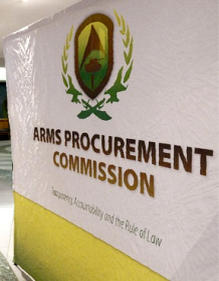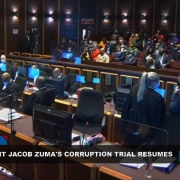|
Getting your Trinity Audio player ready...
|
 Dear Corruption Watch,
Dear Corruption Watch,
I have been following the Seriti Commission hearings into the arms deal and have a couple of questions: if there is general dissatisfaction with the procedures, are the process or outcomes subject to judicial review? How will the findings Judge Seriti makes be enforced? And is a commission subject to the same considerations of fairness as a court?
Up in Arms
Dear Up in Arms
The Seriti Commission, chaired by Judge Willie Seriti, which has been tasked with probing the procurement of military equipment in the late 1990s and early 2000s, which many have argued South Africa could not afford and did not need, has recently attracted quite a lot of criticism.
Concerns have been raised about the commission’s integrity and impartiality as it heads into phase two of its work, in which it must probe allegations of massive corruption and irregularity in the strategic defence procurement packages (SDPP) that make up the arms deal.
Moreover, claims of unfairness have been made by Lawyers for Human Rights (LHR), representing three arms deal critics: former ANC MP Andrew Feinstein and researchers Paul Holden and Hennie van Vuuren, who have been called to testify about evidence of corruption. LHR says that its clients have been denied access to documents that are needed to get to the truth. The documents include minutes of meetings where the deals were discussed as well as evidence collected by the law-enforcement investigations during the 2000s. Quite apart from the fact that the documents are needed by the LHR and its clients to prepare their testimony, it is also information that should be available to all as it lies at the heart of any public inquiry into the arms deal.
The Seriti Commission is a crucial opportunity to hold high-raking officials, politicians and global arms corporations to account. The commission is charged with the duty of establishing, inter alia, whether the allegations of corruption have merit and the identity of persons involved therein.
In principle at least, any failure to properly discharge that duty, as well as any alleged unfairness in the process, could well be the subject of judicial review.
What about the enforcement of Judge Seriti’s findings? It is important to note that the Seriti Commission does not have the power to actually find any person guilty of a criminal offence or civilly liable. The commission’s terms of reference merely say that it must inquire into, make findings and report on whether any person, within or outside the government of South Africa, improperly influenced the award or conclusion of any of the contracts awarded in the SDPP procurement process. It can also make recommendations on whether legal proceedings should be instituted to cancel such contracts.
The commission’s findings in this regard, in its ultimate report, may therefore accuse certain people. The ultimate result may be criminal or civil proceedings against such persons. That would, however, require further steps to be taken by the appropriate authorities.
It is now established in our law that even though a commission may not have the powers to finally determine any rights the whole process is potentially prejudicial to parties. The courts have held that because of the potential prejudice flowing from the allegations contained in the findings made, the commission has a duty to treat the people who could be implicated fairly. And clearly those who want to present evidence of corruption are entitled to fairness too. The fact that the Seriti Commission merely investigates and reports, possibly with recommendations, is not a reason to jettison the requirement of fairness in its proceedings.
• This article was first published in Sunday Times: Business Times









